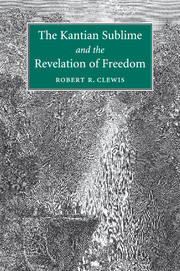Book contents
- Frontmatter
- Contents
- Preface and acknowledgments
- Abbreviations and notes on Kant's texts
- Introduction
- 1 The Observations and the Remarks
- 2 The judgment of the sublime
- 3 Moral feeling and the sublime
- 4 Various senses of interest and disinterestedness
- 5 Aesthetic enthusiasm
- 6 Enthusiasm for the idea of a republic
- 7 Conclusion
- Appendix 1 On the Remarks
- Appendix 2 Some features of the feelings discussed in this book
- Appendix 3 Classification of what elicits sublimity
- Bibliography
- Index
6 - Enthusiasm for the idea of a republic
Published online by Cambridge University Press: 02 July 2009
- Frontmatter
- Contents
- Preface and acknowledgments
- Abbreviations and notes on Kant's texts
- Introduction
- 1 The Observations and the Remarks
- 2 The judgment of the sublime
- 3 Moral feeling and the sublime
- 4 Various senses of interest and disinterestedness
- 5 Aesthetic enthusiasm
- 6 Enthusiasm for the idea of a republic
- 7 Conclusion
- Appendix 1 On the Remarks
- Appendix 2 Some features of the feelings discussed in this book
- Appendix 3 Classification of what elicits sublimity
- Bibliography
- Index
Summary
An Englishman not filled with esteem and admiration at the sublime manner in which one of the most important revolutions the world has ever seen is now effecting, must be dead to every sense of virtue and of freedom; not one of my countrymen who has had the good fortune to witness the transactions of the last three days in this great city, but will testify that my language is not hyperbolical.
The Morning Post (July 21, 1789) on the fall of the BastilleThese words, taken from a report on the storming of the Bastille on July 14, 1789, suggest that the author of this article has undergone an experience of the sublime. Unlike Edmund Burke, who considered unnecessary the “dreadful things” brought about by the French Revolution, the excited writer describes his feelings in terms of esteem and admiration. Note that the author connects the experience of the sublime to a sense of freedom and to virtue.
In some ways Kant has a similar response to the events in France. To be sure Kant, unlike the author, did not witness first hand the events of the French Revolution. But the interest that Kant displays in The Conflict of the Faculties is morally based in the sense articulated in chapter 4. In fact, Kant connects the sublime not just to the sense of freedom of the individuals feeling the sublime, but even to the moral character of the human species as a whole.
- Type
- Chapter
- Information
- The Kantian Sublime and the Revelation of Freedom , pp. 200 - 214Publisher: Cambridge University PressPrint publication year: 2009



